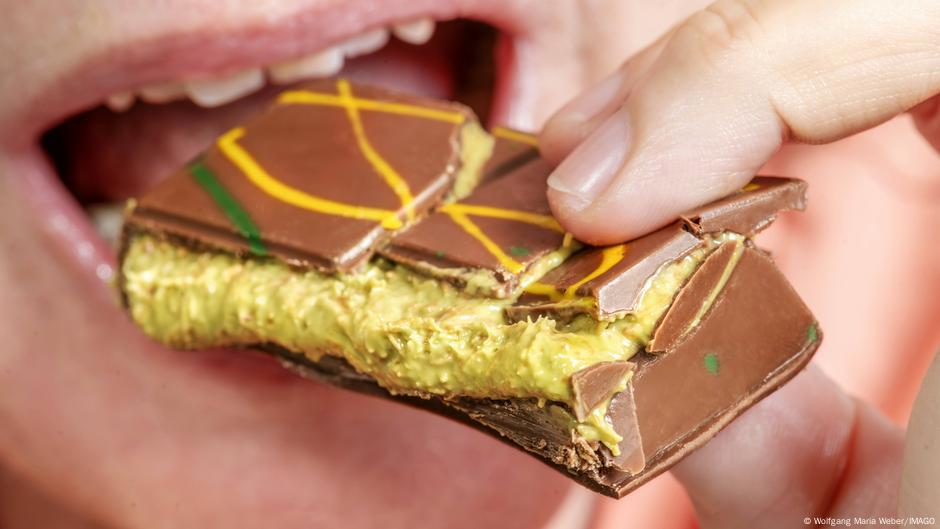Summary
The world is hungry for Dubai chocolate, healthy matcha tea and quinoa. But consumer hype has major environmental and market implications for producers.
Mild milk chocolate on the outside, with soft pistachio cream and crunchy, sugar-sweet kadayif strands on the inside to many consumers, Dubai ch…
Source: DW

AI News Q&A (Free Content)
Q1: What is Dubai chocolate and how has it gained popularity?
A1: Dubai chocolate is a style of chocolate bar that contains kadayif (chopped filo pastry) and a pistachio-tahini cream. It was created in 2021 by Nouel Catis Omamalin and Sarah Hamouda, under the brand Fix Dessert Chocolatier in Dubai. It gained significant popularity in 2024, especially on social media platforms like TikTok, leading to widespread imitation by vendors worldwide.
Q2: How does the cultivation of matcha tea impact the environment?
A2: Matcha tea is made from shade-grown tea leaves, which requires specific agricultural practices that can impact the environment. The shade-growing process is labor-intensive and can lead to increased use of resources such as water and fertilizers. However, matcha tea production is often associated with sustainable agricultural practices, as its cultivation is deeply rooted in Japanese traditions that emphasize harmony with nature.
Q3: What are the health benefits of matcha tea according to recent studies?
A3: Recent studies have shown that matcha tea can improve lipid metabolism and reduce insulin resistance, inflammation, and gut dysbiosis in cases of non-alcoholic fatty liver disease (NAFLD). These effects are attributed to matcha's rich content of catechins, which are potent antioxidants. Matcha also helps modulate gut microbiota, increasing beneficial bacteria like Akkermansia, Faecalibacterium, and Parabacteroides.
Q4: What are the market implications of the growing demand for quinoa?
A4: The increased demand for quinoa, primarily due to its high protein content, has led to a boom in its cultivation beyond South America, including in countries such as the United States and India. This demand has caused quinoa prices to triple between 2006 and 2014. However, the monoculture farming practices that have developed in response to this demand have led to environmental degradation and challenges in maintaining yields.
Q5: How does the quinoa cultivation affect sustainability efforts?
A5: Quinoa cultivation, primarily in the Andean region, faces sustainability challenges due to monoculture practices and climate change. These issues result in environmental degradation and pose a threat to biodiversity. Efforts are being made to develop more sustainable farming practices, such as crop rotation and diversification, to mitigate these impacts and ensure the long-term viability of quinoa production.
Q6: What role does matcha play in the traditional Japanese tea ceremony?
A6: Matcha is central to the traditional Japanese tea ceremony, known as chanoyu or sadō/chadō. This ceremony is a meditative practice that emphasizes mindfulness and spiritual harmony. Matcha is prepared and served with great attention to detail, reflecting the principles of tranquility, respect, and simplicity that are integral to the tea ceremony.
Q7: What are the potential economic impacts of the matcha trend on global tea markets?
A7: The rising popularity of matcha, fueled by its status as a health beverage, has significant economic implications for global tea markets. It has led to increased production in Japan and other regions, influencing tea prices and market dynamics. The demand for high-quality matcha has also encouraged shifts towards more organic and sustainable farming practices, impacting the broader tea industry.
References:
- Dubai chocolate - Wikipedia: https://en.wikipedia.org/wiki/Dubai_chocolate
- Matcha - Wikipedia: https://en.wikipedia.org/wiki/Matcha
- Quinoa - Wikipedia: https://en.wikipedia.org/wiki/Quinoa
- Matcha Green Tea Improves Cafeteria-Diet-Induced NAFLD by Modulating the Gut Microbiota in Rats: https://pubmed.ncbi.nlm.nih.gov/
- Matcha: An IDE Plugin for Creating Accurate Privacy Nutrition Labels: https://arxiv.org/abs/
- Quinoa: a Q-function You Infer Normalized Over Actions: https://arxiv.org/abs/
- Study on the tea market in India: https://arxiv.org/abs/





